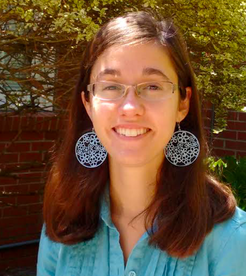How to Use the Americans with Disabilities Act
to Achieve Disability Justice
Friday, June 1, 2018
1pm - 1:45pm
Understanding Your Rights as a Person with a Disability
Emily Rueber and Rebecca Williams
The Southeast ADA Center, a member of the ADA National Network, serves English and Spanish speaking individuals with and without disabilities. The states served are Alabama, Florida, Georgia, Kentucky, Mississippi, North Carolina, South Carolina, and Tennessee. Based upon the requests for information about the Americans with Disabilities Act that include information about service animals, accommodations in schools, the Fair Housing Act, and the Air Carrier Access Act, we have developed a presentation that addresses each of these topics. See the outline below.
I. Overview of the Southeast ADA Center, a member of the ADA National Network.
A. Provides assistance to Spanish speakers by the way of translated calls between the caller and our Americans with Disabilities Act (ADA) information specialists.
B. Offers ADA materials in Spanish.
C. We can answer most questions from Spanish-speaking individuals.
i. For example, individuals may call the center with questions about rights to reasonable accommodations in the workplace or disability issues at a child’s school.
ii. We can also answer questions about the Fair Housing Act and the Air Carrier Access Act as it relates to travel with service or emotional support animals and reasonable accommodations.
II. Types of information we provide include, but are not limited to:
A. Service Animals
i. What are they?
a. Under the ADA, only dogs that are specifically trained to perform one or more tasks/services for a person with a disability can be recognized as a service animal.
ii. Can they be trained to follow commands in Spanish?
a. Yes, but if you are looking for a professional trainer, it is more likely that a trainer will train them to follow hand signal commands.
iii. Types of service animals: dogs and miniature horses
a. Dogs: guide dogs, mobility/stability, seizure and other medical alert tasks (cardiac, diabetic), psychiatric, autism, and dementia service dogs
b. Miniature horses per revised ADA regulations, which include a separate provision for miniature horses that are individually trained to do work or perform tasks for people with disabilities.
B. Reasonable accommodations at school (K-12)
i. May be required under the ADA, Section 504 of the Rehabilitation Act, and/or the Individuals with Disabilities Education Act (IDEA)
ii. They are offered to students with many types of disabilities (e.g., learning, physical, intellectual, and sensory)
C. Reasonable accommodations at post-secondary institutions (e.g., technical school, college, or university)
i. May be required under the ADA and Section 504 of the Rehabilitation Act
ii. A person studying at a post-secondary institution is responsible for requesting accommodations and providing appropriate documentation to support their request.
iii. The IDEA does not apply to students at post-secondary institutions.
iv. NOTE: Under the Fair Housing Act, students may be permitted to have emotional support animals (not limited only to dogs) in student dorms; however, emotional support animals are not allowed elsewhere on campus. Students may be eligible for accommodations in college housing including the right to have an emotional support animal in their dorm.
D. Fair Housing Act
i. Emotional support animals
ii. Architectural barriers
iii. Communication barriers
E. Air Carrier Access Act
i. Traveling with emotional support animals
ii. Reasonable accommodations in air travel
iii. Airport responsibilities versus air carrier responsibilities
III. Questions?
Emily Rueber and Rebecca Williams
The Southeast ADA Center, a member of the ADA National Network, serves English and Spanish speaking individuals with and without disabilities. The states served are Alabama, Florida, Georgia, Kentucky, Mississippi, North Carolina, South Carolina, and Tennessee. Based upon the requests for information about the Americans with Disabilities Act that include information about service animals, accommodations in schools, the Fair Housing Act, and the Air Carrier Access Act, we have developed a presentation that addresses each of these topics. See the outline below.
I. Overview of the Southeast ADA Center, a member of the ADA National Network.
A. Provides assistance to Spanish speakers by the way of translated calls between the caller and our Americans with Disabilities Act (ADA) information specialists.
B. Offers ADA materials in Spanish.
C. We can answer most questions from Spanish-speaking individuals.
i. For example, individuals may call the center with questions about rights to reasonable accommodations in the workplace or disability issues at a child’s school.
ii. We can also answer questions about the Fair Housing Act and the Air Carrier Access Act as it relates to travel with service or emotional support animals and reasonable accommodations.
II. Types of information we provide include, but are not limited to:
A. Service Animals
i. What are they?
a. Under the ADA, only dogs that are specifically trained to perform one or more tasks/services for a person with a disability can be recognized as a service animal.
ii. Can they be trained to follow commands in Spanish?
a. Yes, but if you are looking for a professional trainer, it is more likely that a trainer will train them to follow hand signal commands.
iii. Types of service animals: dogs and miniature horses
a. Dogs: guide dogs, mobility/stability, seizure and other medical alert tasks (cardiac, diabetic), psychiatric, autism, and dementia service dogs
b. Miniature horses per revised ADA regulations, which include a separate provision for miniature horses that are individually trained to do work or perform tasks for people with disabilities.
B. Reasonable accommodations at school (K-12)
i. May be required under the ADA, Section 504 of the Rehabilitation Act, and/or the Individuals with Disabilities Education Act (IDEA)
ii. They are offered to students with many types of disabilities (e.g., learning, physical, intellectual, and sensory)
C. Reasonable accommodations at post-secondary institutions (e.g., technical school, college, or university)
i. May be required under the ADA and Section 504 of the Rehabilitation Act
ii. A person studying at a post-secondary institution is responsible for requesting accommodations and providing appropriate documentation to support their request.
iii. The IDEA does not apply to students at post-secondary institutions.
iv. NOTE: Under the Fair Housing Act, students may be permitted to have emotional support animals (not limited only to dogs) in student dorms; however, emotional support animals are not allowed elsewhere on campus. Students may be eligible for accommodations in college housing including the right to have an emotional support animal in their dorm.
D. Fair Housing Act
i. Emotional support animals
ii. Architectural barriers
iii. Communication barriers
E. Air Carrier Access Act
i. Traveling with emotional support animals
ii. Reasonable accommodations in air travel
iii. Airport responsibilities versus air carrier responsibilities
III. Questions?

Emily Rueber
Emily Rueber is the Office Coordinator and Spanish Outreach person for the Southeast ADA Center, a project of the Burton Blatt Institute of Syracuse University. Previously, Emily served as a Young Adult in Global Mission program of the Evangelical Lutheran Church in America volunteer for 11 months in Tepoztlan, Morelos, Mexico. She graduated from Georgia Southern University with a B.A. in Spanish in 2016. In college, Emily has been an intern for the BRunswick/Glynn County Judicial Circuit Public Defender and the Rock-Tenn Corporation. She is also a lifetime member of the Girl Scouts. She enjoys hiking, translating, and traveling internationally.
Emily Rueber is the Office Coordinator and Spanish Outreach person for the Southeast ADA Center, a project of the Burton Blatt Institute of Syracuse University. Previously, Emily served as a Young Adult in Global Mission program of the Evangelical Lutheran Church in America volunteer for 11 months in Tepoztlan, Morelos, Mexico. She graduated from Georgia Southern University with a B.A. in Spanish in 2016. In college, Emily has been an intern for the BRunswick/Glynn County Judicial Circuit Public Defender and the Rock-Tenn Corporation. She is also a lifetime member of the Girl Scouts. She enjoys hiking, translating, and traveling internationally.

Rebecca Williams
Rebecca Williams has been employed as the Information Specialist for the Southeast ADA Center since 2011. She provides technical assistance and resources/referrals to callers from eight southeastern states on the Americans with Disabilities, the Fair Housing Act, Air Carrier Access Act, Individuals with Disabilities Education Act and other disability related inquiries.
Rebecca has over 30 years of experience in the disability field. She has developed and presented numerous workshops and trainings on the ADA to a wide variety of audiences both locally and nationally. Rebecca completed the ADA Coordinator Certification Program offered through the University of Missouri - College of Human and Environmental Sciences, School of Architectural Studies and the Great Plains ADA Center in April 2012.
Rebecca is a member of the National Council for Independent Living (NCIL) and of the Association of Programs for Rural Independent Living (APRIL). She is also a board member of the Lancaster Lions International and is a member of the Millersville University (PA) Disability Arts Advisory Council. Rebecca provides audio description services for live theater for patrons with visual impairments for Millersville University.
Rebecca Williams has been employed as the Information Specialist for the Southeast ADA Center since 2011. She provides technical assistance and resources/referrals to callers from eight southeastern states on the Americans with Disabilities, the Fair Housing Act, Air Carrier Access Act, Individuals with Disabilities Education Act and other disability related inquiries.
Rebecca has over 30 years of experience in the disability field. She has developed and presented numerous workshops and trainings on the ADA to a wide variety of audiences both locally and nationally. Rebecca completed the ADA Coordinator Certification Program offered through the University of Missouri - College of Human and Environmental Sciences, School of Architectural Studies and the Great Plains ADA Center in April 2012.
Rebecca is a member of the National Council for Independent Living (NCIL) and of the Association of Programs for Rural Independent Living (APRIL). She is also a board member of the Lancaster Lions International and is a member of the Millersville University (PA) Disability Arts Advisory Council. Rebecca provides audio description services for live theater for patrons with visual impairments for Millersville University.